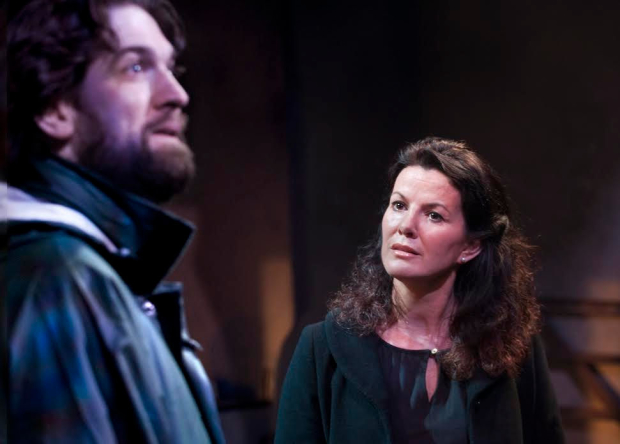Outside Mullingar (Ustinov Studio, Bath)

© Simon Annand
Outside Mullingar has found a more natural home at the Ustinov Studio then when it premiered on Broadway last year. For John Patrick Stanley's play is a delicate piece which captures the yearnings of love; of aches, of things left unsaid, of familial as well as romantic regret. It's a minor piece in terms of its action but the writing has a quiet beauty to it that showcases Shanley as one of America's finest writers.
Mullingar is a small village an hour outside of Dublin, isolated enough to still feel like a relic from a time long past. It's a place where the rain falls, the loneliness is stark and gloom casts a long shadow. It's clear though from the first sparring session between Anthony (Owen McDonnell) and Rosemary (Deirdre O'Kane) that the clouds will lift and the sun will rise again. For these two farmers, in the first flush of middle age, will fall into familiar romantic comedy tropes. It's a robust enough piece of writing that even as we know where it's headed we're happy to be taken for the ride.
These two are tied together in matters of inheritance. Anthony is hoping to get the family farm from his father Tony (James Hayes) who is concerned that his son is too soft to run the land and is thinking of selling it on to his nephew in America. To complicate matters further Rosemary owns a strip of land slap bang in the middle of the farm, which is going to scupper any future sale. A bit of land with childhood significance to her, Rosemary is not going to part with it for any monetary price. Only love may sort it out.
McDonnell and O'Kane spar like a latter day Beatrice and Benedick, but there is clear hurt in both their lives. McDonnell is all hangdog boyishness, a sensitive soul, still pining for a lost teenage love and too scared to reveal his secret that made her run. O'Kane is sturdier, a women made tough on years of waiting for her man and not prepared to wait any longer. Hayes as the cranky father who, in a moving latter scene, as he sits dying, reveals the moment he fell in love with his wife and mother of his child. The writing is so quietly exquisite and the performance so full of love and regret that one forgets to breathe; there is nothing else here that quite reaches this height in Sam Yates's thoughtful production, but it's worth the admission on its own.
The ending may be a little too saccharine for some but for those of us who believe in love in all its form it's resolutely satisfying. The little gasp that falls out of O'Kane's mouth encapsulates all the years of yearning and loneliness and hope for the future to come. The sun has finally come out in Mullingar.










